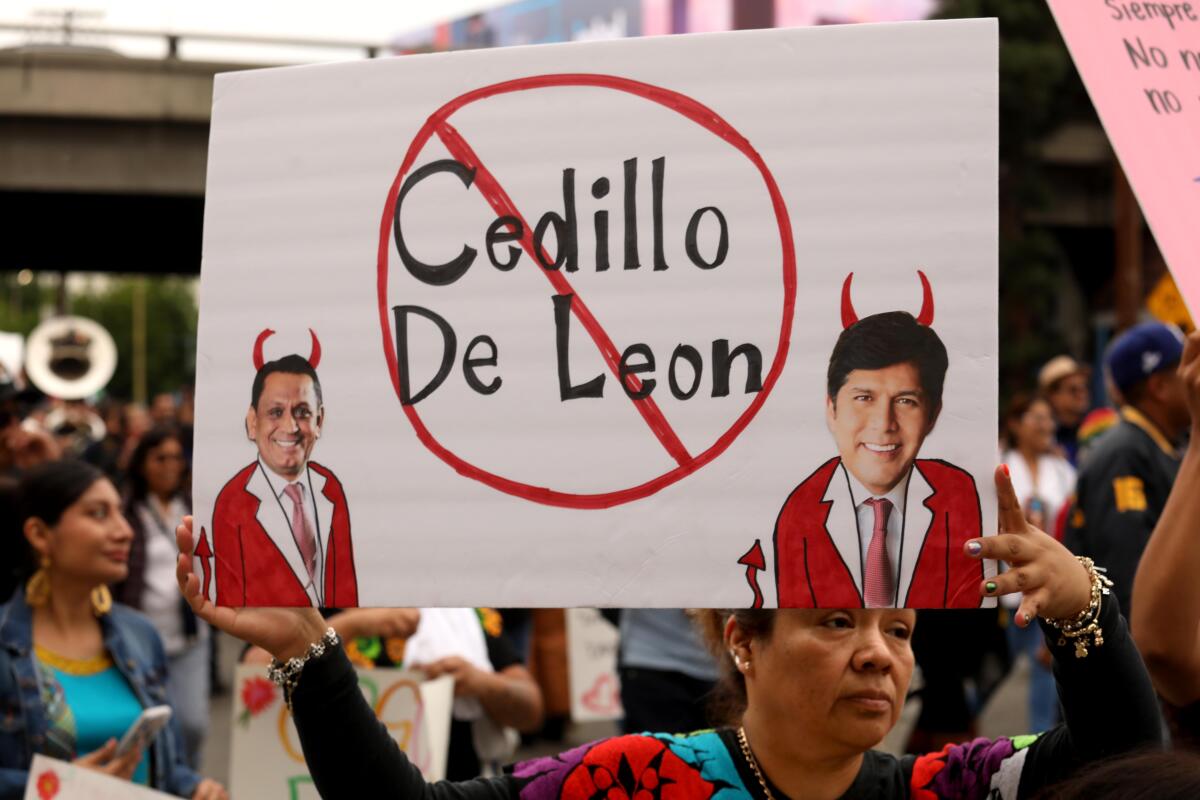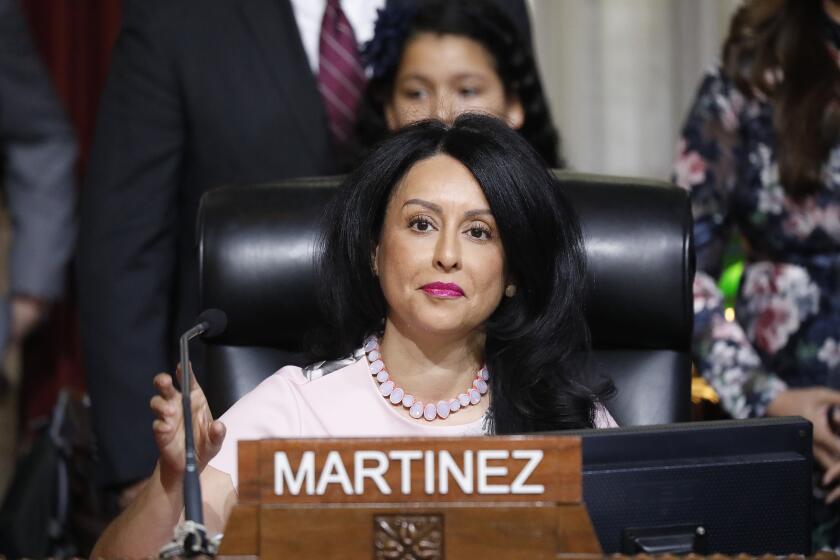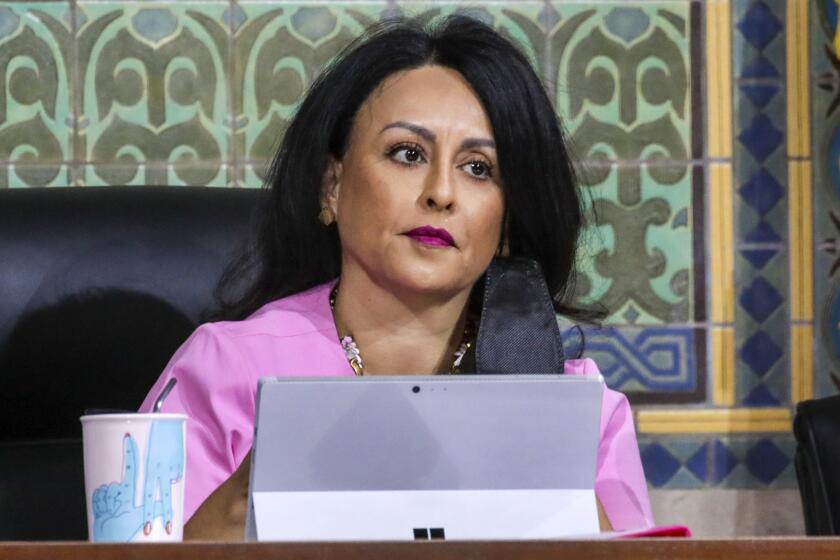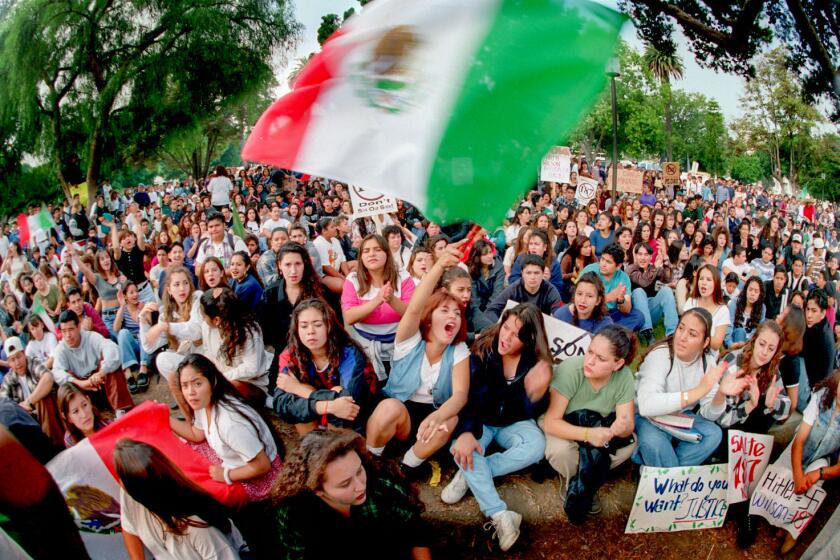L.A. Latinos grapple with familiar colorism against Black and Indigenous people in racist tape

- Share via
On the Eastside streets of Los Angeles, Ana Castro is a political foot soldier of local acclaim, known as “La del Mopeador.”
For decades, the 67-year-old janitor marched in street protests and knocked on doors carrying a floppy string mop as a working-class totem, earning her the Spanish moniker “the Mop Woman.”
Los Angeles City Councilmember Kevin de León showed up at Castro’s apartment in Montecito Heights when he was looking for help campaigning for assemblyman, and she started going straight from her night shift cleaning high-rise offices to canvassing for him on the Eastside. She did the same for Councilmember Gil Cedillo.
She is una guerrera, a warrior, say Latino politicians and activists, fighting for immigrants and tenants and workers, for those too often ignored.
Now, like the legions of Latinos she has marched with, she is bereft, sickened by the racist rhetoric on the leaked conversation among Latino councilmembers that emerged last week, fearing it will undermine what has become her life’s crusade.
“They did so much damage,” she said. “What are we going to tell people when we call during campaigns?”
With Los Angeles still reeling from a leak revealing prominent elected officials making bigoted and racist remarks, much about the recording remains a mystery: Who made it? And how? Who leaked it? And why?
The year-old, secretly recorded audio revealed Councilmembers Nury Martinez, De León and Cedillo cooking up redistricting plans with county labor boss Ron Herrera as the three mapped out ways they could keep their districts and those of their allies. Martinez mocked Oaxacans as “little short dark people” and “so ugly” and compared a white councilmember’s young Black son to a monkey. In reference to Los Angeles County Dist. Atty. George Gascón, she said “F— that guy. … He’s with the Blacks.”
What struck many Latinos was that most of the vulgarity came from Martinez, the daughter of Mexican immigrants who often framed policies around the working-class residents in her district. The struggles her family endured were the backdrop of her political story. And her story, as well as De León’s and Cedillo’s, were points of inspiration.
Suddenly, they were sounding like the old-school white leaders running the city in back rooms, whom they had to fight to get a seat at the table.
But that appearance skews the reality: Latinos make up nearly half of Los Angeles and hold only four seats on the 15-member council. Their power requires them to build alliances with Black, white and Asian political leaders. And those coalitions are all up in the air now.
Martinez and Herrera have resigned, and the calls are deafening for De León and Cedillo to do the same.
Within Latino circles, a particularly unsettling aspect of the recording was the colorism that people sometimes still hear in their neighborhoods, at barbecues and around dinner tables. The comments about Black and Indigenous people displayed a prejudice against darker skin that, while not ubiquitous, still runs deep in the community and is rooted in the colonial eras of Mexico and Central America.
“This is not just four bad apples,” said Alejandra Valles, chief of staff of SEIU United Service Workers West.
“We have to use this opportunity as reflection and honesty about the anti-Blackness, the anti-Indigenous colorism and racism in the Latino community. Because that’s happening.”
She just wishes these issues had been confronted from within and did not endanger the difficult work she and others have done to uplift Latino communities.
A leaked recording of L.A. City Council members and a labor official includes racist remarks. Council President Nury Martinez apologizes; Councilmember Kevin de León expresses regret.
Valles and many other Latinos worry that the recordings will damage decades of that coalition-building and erode trust in Latino leaders. They fear they could spark infighting and pit already disadvantaged groups against one another — Black and brown, immigrant and union worker, Latinos of different shades. And the long-fought efforts to expand Latino representation could be undermined.
“Every one of us has been tainted by this and every one of us has been shamed by it,” said former Los Angeles County Supervisor and City Councilmember Gloria Molina.
She fears that as Los Angeles leans toward a Latino majority, brown leaders will be under suspicion. And that these words will play into right-wing conspiratorial ideas such as replacement theory, which has been used to fuel white supremacist sentiment.
“Let’s face it. There are people out there that wonder what is being said behind closed doors about ‘the color of our skin,’” she said. “ ‘Do we trust them or not trust them?’ ”
This comes as tensions are rising across Los Angeles. A study from Loyola Marymount this year found that the perception of race relations had fallen to the worst point since researchers started surveying residents in 1997.
Roughly 68% of respondents found it very or somewhat likely that riots or other disturbances like those of 1992 will occur in the next five years.
Shortly after the revelation of the taped conversation, officials and community leaders — including President Biden — called for all four involved to resign. But the same calls from many Latino officials and organizations carried a larger message: We won’t mimic the racism that has been directed at us.
Sen. Alex Padilla, a longtime ally and high school classmate of Martinez, tweeted: “At a time when our nation is grappling with hate speech and hate crimes, these racist comments have deepened the pain our communities endured. Los Angeles deserves better.”
After the leak broke, Antonia Hernández, who heads the California Community Foundation, called a Zoom meeting of prominent Latinos to discuss how to handle the revelations. Many in the meeting have long known and supported the four but on Monday decided to call for their resignation in an open letter. Tolerating such crude language could be devastating, the group reasoned.
“These elected officials have failed us and our community as leaders. They have deepened the pain that our communities have experienced especially during a time when our nation has been struggling with hate speech and political division,” the letter said.
Among those who signed the letter was Arturo Vargas, head of the National Assn. of Latino Elected and Appointed Officials; Angelica Salas, who leads the Coalition for Humane Immigrant Rights; Fabian Núñez, former California Assembly speaker; and Miguel Santana, once the city’s top budgetary officer.
“It was not an easy thing for any of us because we all could share our own stories about how we know the three of them,” Santana said. “But knowing that it was particularly important as Latino leaders to make it clear where we stand and also making it clear that the only way that the city could actually heal and move forward is for them to resign.”
He worries that the recording will raise questions about whether a future Latino majority will govern not just for Latinos but for everyone.
What makes it so agonizing for many Latino leaders is that they worked closely for so many years with all four of the people on that tape.
At L.A. City Hall, Nury Martinez has been known as a blunt speaker. She is now in political free fall over words that she was caught saying on leaked audio.
“It was painful. I can’t explain to you, I was so hurt,” said Hernández about the audio. “It sets us back, and the saddest part is that it doesn’t reflect who we are.”
Hernández has been at the forefront of some of the most groundbreaking political and legal battles for Latinos. She led the Mexican American Legal Defense and Education Fund during a charged redistricting fight in court that eventually led to the 1991 election of Molina on the county Board of Supervisors to represent the Eastside in a first Latino district. She oversaw MALDEF’s legal challenge of Proposition 187, a ballot measure that sought to deny many public services to undocumented immigrants.
She has known both De León and Cedillo for decades and doesn’t believe they are racist.
Cedillo, whom she tutored when she was in college, is best known for relentlessly pushing legislation to give immigrants who are in the country illegally the right to obtain a driver’s license.
De León, the child of immigrants from Guatemala, was an organizer against Proposition 187; Hernández remembers him putting together pamphlets. He went on to fight for landmark environmental legislation and became a shrewd legislator as president pro tem of the California Senate.
Martinez was one of the most powerful people in Los Angeles, a product of the Cal State University system who fervently advocated for poor residents in her northeast Valley district and the city as a whole.
Hernández is aghast at the wreckage a single conversation has wrought.
“I’ve been in a lot of tough meetings,” she said. “I have never been in a meeting where you talk about people that way.
“We have worked so hard to form alliances,” she added. “I tell people we are together. The coalition of Asian American, African American and other folks that have been excluded from the process, we will move forward. But right now we are going to have to a lot of healing.”
Since the tape was released, angry protests in the council chambers have made it impossible to hold regular meetings. On Saturday, frustration spilled into the streets as hundreds of Oaxacan residents called for Cedillo and De León to resign.
“This is so devastating to the Latino narrative of the last 30 years,” said Mike Madrid, a longtime political consultant who is writing a book about Latino politics in the U.S. All of those present in the room came up in the generation of Proposition 187, he pointed out, a watershed moment that has shaped Latino politics in California and the country ever since.
Every year between 1994 and 2013, he said, an anti-immigrant bill was introduced in Sacramento or drafted as a state ballot measure. The issues cut to the heart of race relations, from affirmative action to bilingual education.
“It was the defining moments of Latino politicization. It was predicated on the notion that Latinos would fight inherent racism, that it would fight discrimination, and that presumably it would bring about a healthier way for a pluralistic society to function,” Madrid said. “That’s why this was so painful. That has crashed; that has shattered that mythology.”
The student marches were the culmination of a month of anti-Proposition 187 teach-ins, debates, letter-writing campaigns and some of the largest protests California had seen since the Vietnam War.
At a former mortuary turned office space for SEIU United Service Workers West, Lulu Vargas, a Oaxacan janitor who has met Martinez and campaigned for De León, said she was “deceived.”
“The only thing that we have done is support them,” she said. “And to be called short and ugly?”
The union, which once strongly backed De León, led a march to his office last week demanding that he resign.
Manuel Pastor, director of USC’s Dornsife Equity Research Institute, said the type of racism on display in the audio goes back to Mexico and Central America, where many Angelenos have their roots.
Though mixed-race Latinos are often viewed as salt-of-the-earth countrymen, people with Spanish blood and light skin continue to enjoy the most economic and social status, and Afro-Latinos and Indigenous people are often denigrated even as their art, culture and history are celebrated.
“They have a celebration of the mestizo and at the same time have tremendous anti-Indigenous sentiment and anti-Black colorism that goes on,” Pastor said.
Arriving in the racially stratified United States can serve to reinforce those beliefs, he added. “I think the kind of things that were said in that meeting were the kind of things Latinos heard their crazy tío say, but there’s an expectation that political leaders have conversations behind closed doors that can actually stand the light of day.”
The irony now is that the result of that infamous meeting is the exact opposite of what its objective was in retaining Latino power.
Martinez’s departure will lead to a special election. Cedillo is being replaced by Eunisses Hernandez in December, and what will happen with De León’s seat is unclear. Last week the City Council had one Latino councilperson in attendance, Monica Rodriguez.
She said that she was not invited to the meeting and that the scandal only strengthens her commitment as a civil servant.
“I would never be included to anything like this because people that know me, and know who I am, know that I am playing by the rules,” she said.
Helen Torres, chief executive of Hispanas Organized for Political Equality (HOPE), is optimistic. Her group trains Latina leaders and nurtured Martinez early in her career. Torres was heartbroken by the tape and called for all involved to resign. But she looks forward to a new generation of leaders.
“We should never be defined by one leader,” Torres said. “People have always asked the Latino community, ‘Who is your leader?’ There’s never been one answer to that, and I think that’s always been our strength. Because as people stepped down, there’s gonna be an incredible group of leaders that will step up.”
More to Read
Sign up for Essential California
The most important California stories and recommendations in your inbox every morning.
You may occasionally receive promotional content from the Los Angeles Times.















